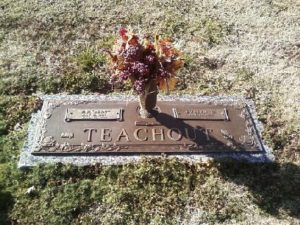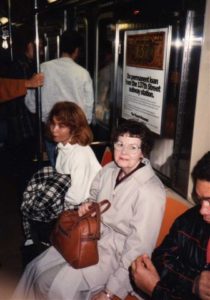 Evelyn Teachout, my beloved mother, died five years ago this past weekend. Her death is still as vivid to me as if it had happened last night, no doubt in part because I wrote about it in detail not long after the fact. I can close my eyes and see every detail of the nursing-home room in which her long life drew to a close. Yet it really did happen not yesterday but in 2012—the same year, hard as it is for me to grasp, in which John Douglas Thompson first appeared in Satchmo at the Waldorf at Shakespeare & Company in Massachusetts.
Evelyn Teachout, my beloved mother, died five years ago this past weekend. Her death is still as vivid to me as if it had happened last night, no doubt in part because I wrote about it in detail not long after the fact. I can close my eyes and see every detail of the nursing-home room in which her long life drew to a close. Yet it really did happen not yesterday but in 2012—the same year, hard as it is for me to grasp, in which John Douglas Thompson first appeared in Satchmo at the Waldorf at Shakespeare & Company in Massachusetts.
That was quite a year. Among other things, Mrs. T and I drove that summer from San Francisco to San Diego on Highway 1, hitting the road a couple of days after my mother’s funeral. I also received a Guggenheim Fellowship, spent a month working on Satchmo and Duke at the MacDowell Colony, and wrote my five hundredth Wall Street Journal drama column. All these things were and are important to me—yet they are as nothing next to the irreducible, inescapable fact of my mother’s death. We were close my whole life long, and we talked on the phone two or three times each week until her final illness left her too frail to speak. Then, all at once, she was gone, never to return.
I wrote about her often, never more truly than in this 2010 posting about gratitude:
I haven’t mentioned her lately in this space, so perhaps it’s worth saying that my mother did everything right (other than failing to teach me how to cook). Evelyn Teachout, who turns eighty-one in June, mysteriously neglected to make any of the all-too-familiar mistakes that blight the lives of so many of the people I know. She showed me how to laugh, admired my achievements, brushed off my failures, assured me whenever necessary that pretty much anything I wanted to do in life would be fine with her, and never left me in the slightest doubt of her love. She embedded in me what Freud called “that confidence of success that often induces real success.” You can’t get much luckier than that.
 A few days after she died, I received and posted this e-mail from a New York friend who sent flowers to her funeral:
A few days after she died, I received and posted this e-mail from a New York friend who sent flowers to her funeral:
I was the white roses, because your mother seemed like white roses to me. When I called the local florist, it was early Monday morning, nine a.m. I figured out where your mother might be from Google, and called around. When I got the flower shop that starts with P, I tried to explain who I was and what I wanted, and who the flowers were for. The woman who answered the phone asked for the family name, and when I told her she sucked in her breath: “Oh, she was a lovely woman, a wonderful woman.” And then in this little Midwestern way, she managed to tell me she was not claiming closeness, just declaring what was obvious. It was so touching, and we had a nice talk.
I couldn’t describe her any better than that kindly florist did in nine simple words.
The same friend asked me the other day to sum up my life. “I had a mother who believed I could do anything I wanted,” I replied. “Now I have a wife who believes the same thing. That’s the whole story, right there.” We make ourselves, but without the steadfast love of those two women, I’d be unimaginably different. Not many people get that lucky twice in a lifetime. I did, and so did my brother.
I miss you, Mom. I always will.
* * *
William Warfield and Aaron Copland perform Copland’s arrangement of “At the River”:
